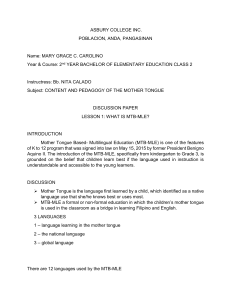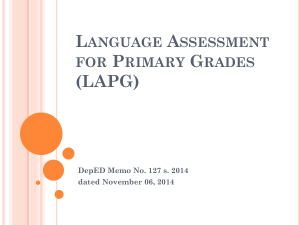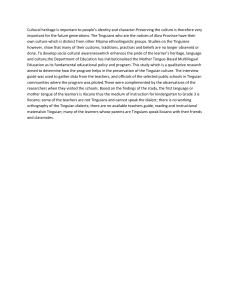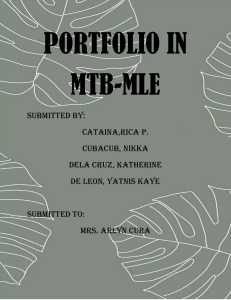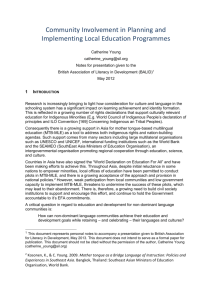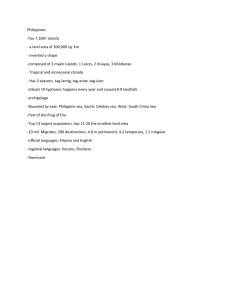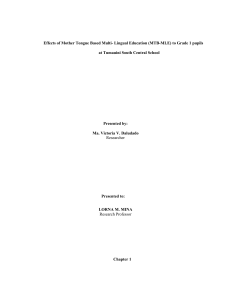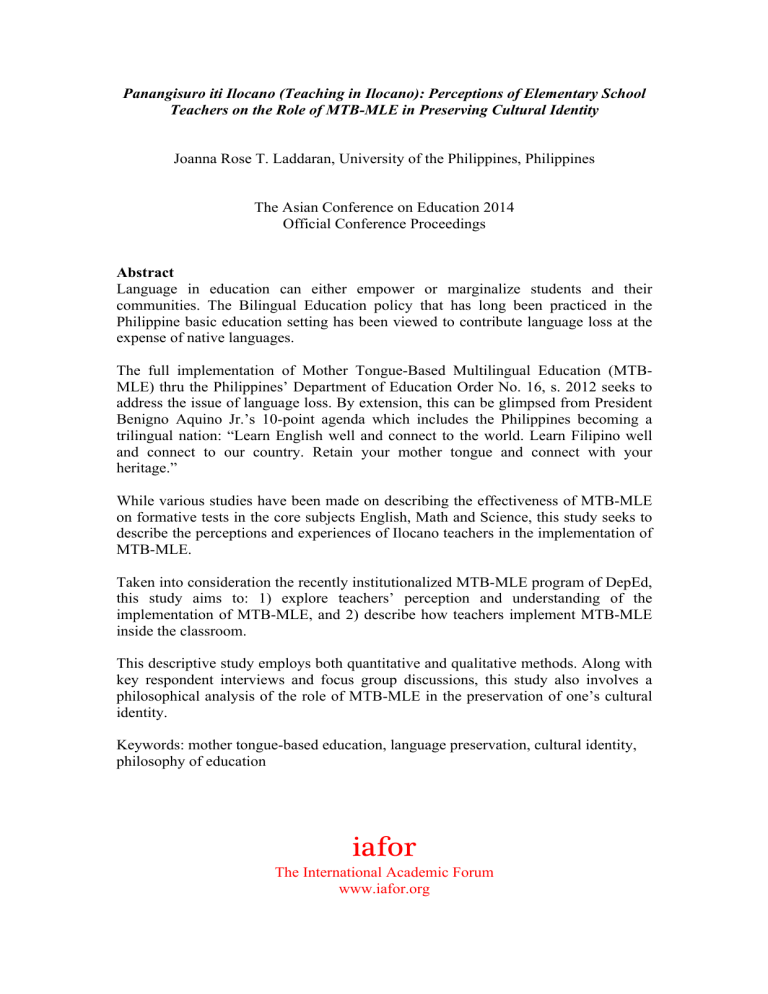
Panangisuro iti Ilocano (Teaching in Ilocano): Perceptions of Elementary School Teachers on the Role of MTB-MLE in Preserving Cultural Identity Joanna Rose T. Laddaran, University of the Philippines, Philippines The Asian Conference on Education 2014 Official Conference Proceedings Abstract Language in education can either empower or marginalize students and their communities. The Bilingual Education policy that has long been practiced in the Philippine basic education setting has been viewed to contribute language loss at the expense of native languages. The full implementation of Mother Tongue-Based Multilingual Education (MTBMLE) thru the Philippines’ Department of Education Order No. 16, s. 2012 seeks to address the issue of language loss. By extension, this can be glimpsed from President Benigno Aquino Jr.’s 10-point agenda which includes the Philippines becoming a trilingual nation: “Learn English well and connect to the world. Learn Filipino well and connect to our country. Retain your mother tongue and connect with your heritage.” While various studies have been made on describing the effectiveness of MTB-MLE on formative tests in the core subjects English, Math and Science, this study seeks to describe the perceptions and experiences of Ilocano teachers in the implementation of MTB-MLE. Taken into consideration the recently institutionalized MTB-MLE program of DepEd, this study aims to: 1) explore teachers’ perception and understanding of the implementation of MTB-MLE, and 2) describe how teachers implement MTB-MLE inside the classroom. This descriptive study employs both quantitative and qualitative methods. Along with key respondent interviews and focus group discussions, this study also involves a philosophical analysis of the role of MTB-MLE in the preservation of one’s cultural identity. Keywords: mother tongue-based education, language preservation, cultural identity, philosophy of education iafor The International Academic Forum www.iafor.org I. Introduction Arzadon (2010) holds that our language is a major part of our identity. Language defines who we are. However, there are those who consider the use of the mother tongue to be less prestigious than using other languages like Filipino and English in particular. When asked why, others answer that the use of the mother tongue is too “native” – indicating that the word “native” has been associated to mean something “inferior”. These are instances of undervaluing one’s linguistic identity, and further, one’s cultural identity as a whole. In connection to education, the tendency of some teachers towards giving prestige to the English language over the mother tongue is implicitly conveyed to the students, and has a high possibility to be emulated by the students beyond the classroom. To address issues such as language loss, the Department of Education (DepEd) has started institutionalizing the use of Mother Tongue-Based Multilingual Education (MTB-MLE) through DepEd Order No. 74, s. 2009. More recently, thru DepEd Order No. 16, s. 2012, DepEd has mandated that starting SY 2012-2013, MTB-MLE shall be implemented in all public schools, specifically in Kindergarten, Grades 1, 2 and 3 as part of the K to 12 Basic Education Program. As cited by Dr. Giron on her presentation entitled The K to 12 Basic Education Program and MTBMLE: From Policy to Practice, the MTB-MLE envisions that: “Learners are enjoying relevant and quality education which supports their home languages and cultures; learning outcomes are improved nationwide; and the Philippines is succeeding in its goal for Education for All.” The MTB-MLE aims to provide education that is closely linked with the pupils’ home languages and cultures. The full implementation of the MTB-MLE in the SY 2012-2013 is viewed to address the issue of the decline in the use of Iloko in the province of La Union. Among the desired outcomes of MTB-MLE is the “conscious reflection on heritage language and culture” (Young, 2012). By extension, this can be glimpsed from the 10-point agenda of President Benigno S. Aquino III which includes the Philippines becoming a trilingual nation: “Learn English well and connect to the world. Learn Filipino well and connect to our country. Retain your mother tongue and connect with your heritage.” In view of these, this study seeks to examine the role of mother tongue education in preserving one’s cultural identity. It also seeks to provide baseline information on the perceptions of teachers regarding the initial implementation of MTB-MLE. II. Methodology 2.1 Research Questions Taken into consideration the recently institutionalized MTB-MLE program of DepEd, the main purpose of this study is to describe how teachers and students perceive the implementation of MTB-MLE. In particular, this study aims to answer the following research questions: 1. What are the teachers’ perceptions on the implementation of mother tongue-based multilingual education? 2. How are the teachers implementing mother tongue-based multilingual education? 2.2 Research Design The descriptive research design, particularly qualitative research is utilized in this study. According to Calmorin (2003), the descriptive method of research is useful in gathering information about the present existing condition. This study describes the perceptions and experiences of students and teachers on the recently implemented MTB-MLE. 2.3 Sampling The sampling method used in this study is purposive sampling. The school was chosen by the researcher from a list of all the elementary schools in the Division of La Union based on the following criteria: • The school must have started implementing MTB-MLE from SY 2012-2013 • The school is in a rural area in order to look into the perception of teachers where the Ilocano language is spoken by the majority. The school where the study was conducted was a public elementary school located in a rural area in the province of La Union. It is primarily an agricultural town with 13,422 people in 2,520 households (according to 2000 census). The estimated travel time by car is one (1) hour from DepEd Region 1 Office located in San Fernando City, La Union. From DepEd National Office located in Metro Manila, the estimated travel time by car is four to five (4 – 5) hours. The distance of the school is noted in relation to the cascading of learning materials and other directives from DepEd. A total of seven (7) respondents were included in the study. The teachers interviewed were from Kindergarten, Grades 1, 2 and 3 – the grade levels specified in DepEd Order No. 16, s. 2012 regarding MTB-MLE implementation. In order to gather perspective of a teacher not implementing MTBMLE inside the classroom, a Grade 6 teacher was included in the study. Students who were available at the time of the researchers’ visit were also interviewed. The head teacher or principal of the school was also interviewed to provide a school administrator’s point of view. In addition, one (1) language consultant on language rights and policies from the province of La Union was included in the study to provide insights on the local government’s initiative towards the preservation and promotion of the use of the Ilocano language in the province. 2.4 Research Instrument Focus group discussion (FGD) and in-depth interviews were conducted for data collection. The FGD enabled an interactive and lively response from the teachers as they were able to collaborate and share with each other their experiences in MTBMLE implementation. To establish rapport with the respondents, the researcher opted to use Ilocano in conducting the interview and focus group discussions. The respondents granted the researcher permission to audio-tape the focus group discussions and interviews. 2.5 Data Analysis The researchers’ field notes and transcript of audio recordings of interviews and focus group discussions were consolidated for the coding of responses. The responses were coded based on the ID No. assigned by the researcher for each respondent. The responses were classified under emerging key themes. A synthesis summarizing the responses from each identified theme, including selected verbatim quotations are presented in this study. III. Findings and Analysis The following results are classified to address the two key questions: 1) What are the teachers’ perceptions on the implementation of MTB-MLE? and 2) How do teachers implement MTB-MLE? The result of the interview with the language consultant on language, rights and policies is also presented in this section. 3.1 What are the perceptions of teachers on MTB-MLE? In the case of the school where the study was undertaken, the overall perception of the students and teachers on MTB-MLE implementation varied. The teachers have both positive and negative perceptions regarding the implementation of MTB-MLE. As one teacher provided as a comment in the course of MTB-MLE implementation, • “Minsan mayyat, minsan maddi” (Sometimes it’s good, sometimes it’s not.) (T2) When probed further, the teachers explained their perception of MTB-MLE into the following topical areas: (1) better understanding of lessons, (2) more active class participation of students, (3) catering to students whose mother tongue is not Ilocano, (4) unclear transition from Grade 3 to Grade 4. 3.1.1 Better Understanding of Lessons The teachers claimed that MTB-MLE helps students to understand the lessons better. As one teacher reasoned out, “Natural. Nalaklaka da nga maawatan.” (It’s natural. They [students] understand easily.) (T1) In addition, majority of the students interviewed claimed that MTB-MLE is good primarily because they understand the language used by the teachers in teaching. Particularly, the students claimed: • “Agsasau ni maestra iti Ilocano” (Our teachers talk in Ilocano.) (S3) • “Mayyat, maawatak” (It’s good, I understand.) (S1) To probe the students’ understanding of the Ilocano language, the researcher asked the students interviewed if they understood the meaning of the greeting, “Naimbag nga bigat yo, patpatgen mi a maestra.” (“Good morning, our dear teacher.”) The students looked at each other and then glanced at their teachers who nodded. The students then answered, “Wen, ma’am.” (Yes, ma’am.) The researcher then asked the students what “patpatgen” means. The students looked at their teachers again. The teachers laughed and asked each other, “Ay wen. Anya aya kayat na kaswen iti patpatgen?” (“Right. What does ‘patpatgen’ mean?”) After a few minutes, the Head Teacher answered, “Ay-ayaten.” (liked/revered/dear) The scenario above is an instance where students merely memorize words without clear understanding of the terms used. The researcher then asked the teachers what they do in cases where students are not familiar with the Ilocano words used. The teachers answered that DepEd instructed them to stick to the more familiar terms being used in the community. For instance, instead of using the Ilocano word “maris”, they can use the more common term “kolor” (color). 3.1.2 More active classroom participation of students All of the teachers noted they have noticed a more active participation from the students as they began implementing MTB-MLE. This supports the study of Stone (2012) that “students participate more actively in the classroom when the teacher and students are speaking the mother tongue”. Further, Stone explains that the increase of students’ participation was “because they can contribute more when they understand the language of instruction.” One teacher compared her classroom experience in teaching the mother tongue where students were actively raising their hands and answering questions without being asked to recite. This is in contrast with the classroom situation when it comes to the English subject where most of the time, only the teacher talks in class. When it comes to classroom discussions where the medium of instruction is not familiar with them, the students tend to remain quiet in class. However, one teacher regarded the students’ active participation differently, “Nalalaing da. Nalaklaka da maawatan. Diyay lang ta sobra iti kina-talkative dan, Ma’am. Talaga nga maexpress da amin nga ideas dan.” (They are more intelligent. They understand better. However, they become super talkative. They can express all their ideas.) (T1) In this case, the teacher’s role becomes more of a facilitator of learning – gathering ideas from students rather than the teacher solely providing ideas in class. The researcher recommends that instead of viewing the students’ as being talkative, the teachers should take this as a positive sign of the students’ increased interest in the subject matter or increased understanding of the lessons thereby allowing the students to have confidence in sharing their ideas with the class. 3.1.3 Issues in MTB-MLE Implementation There were also teachers interviewed who posed some reservations regarding the implementation of MTB-MLE based on the following issues: (1) students whose mother tongue is not Ilocano, and (2) unclear transition from Grade 3 to Grade 4. One teacher shared that in order to cater to the individual differences of her students, she exerts extra effort in teaching MTB-MLE to her students whose mother tongue is not Ilocano. Specifically, this teacher noted that, “nu Tagalog iti estudyante, itranslate ko pay iti Tagalog. Sakak to i-Ilocano” (If the student is Tagalog, I translate to Tagalog first. And then I translate to Ilocano.) (T2) Most of the teachers were unclear regarding the transition from Grade 3 to Grade 4 that the respondents asked the researcher if she knows what will happen after Grade 3. This stems from DepEd Order No. 16, s. 2012 which mandates that MTB-MLE will be from Kindergarten to Grade 3. The DepEd Order does not explain what happens after Grade 3. The head teacher/principal even fears that since the English language will only be introduced in Grade 4, the “students may become behind in English” (P1). Another teacher shared that this is also one of the concerns raised by parents of her students: “Narigat nu Grade 4 awan iti Ilocano, marigtan dan tu ngay talaga”. (It would be difficult in Grade 4 where there will be no Ilocano. It would be really difficult for them [students]) (T1) 3.2 How do teachers implement MTB-MLE? When asked how they implement MTB-MLE, the following key issues were raised by the teachers interviewed: (1) teachers’ re-learning of Ilocano, (2) hesitation from parents, and (3) lack of MTB-MLE learning materials. 3.2.1 Teachers’ Re-learning of Ilocano Before the implementation of MTB-MLE, all of the teachers interviewed noted that all subjects from Grades 1 to 6 were taught in Filipino and English. However, since the implementation of MTB-MLE in SY 2012-2013, the Ilocano language has been used as medium of instruction used in all subjects for Grade 1 to Grade 21. In order to teach in the mother tongue, all of the teachers noted that even they have to learn Ilocano. Paulson (2010) mentions that in order to for teachers to teach effectively, they must have to “be able to read and write in the language, and they also need all kinds of support”. The data collected demonstrates that the teachers themselves were re-learning the Ilocano language in order to implement MTB-MLE. All of the teachers interviewed 1 The head teacher/principal noted that in the case of the school used for this study, the MTB-MLE is only implemented in Grade 1 to Grade 2 as the nationwide implementation of MTB-MLE is gradual. Thus, the school is yet to implement MTB-MLE in Grade 3 next school year, 2014-2015 after DepEd conducts MTB-MLE training for Grade 3 teachers. shared that in the course of MTB-MLE implementation, even they have to learn Ilocano on their own. As one teacher responded, “pati teacher ag-ad-adal iti Ilocano” (“Even teachers learn about Ilocano”) (T2). The teachers also shared that they teach each other some Ilocano words such as: • “maris” (color) (T4) • “sucog” (shape) (T1) • “ringhado” (orange) (T3) 3.2.2 Hesitation from Parents Some of the teachers interviewed shared that they have encountered parents who were hesitant in the school’s implementation of MTB-MLE. One teacher recalled her experience with dealing with parents who were hesitant in MTB-MLE implementation, “Adda iti parents nga hesitant lalo Tagalog parents haan da maawatan ken haan nga matulungan dyay anak da iti paggaramid iti assignment” (There are parents who are hesitant especially Tagalog parents who don’t understand [Ilocano]. They cannot help their child in making assignment.) (T1) The head teacher/principal shared a similar experience where one parent went to her and said, “Behind dan tu iti English nga international language” (They [students] will be behind in English which is the international language) (T4) One of the major concerns of these parents was the effect of teaching in the mother tongue in the students’ competency in the English language. The researcher sees this as a result of the prestige given to the English language. By extension, the researcher seems that these parents expect their children’s academic achievement to be measured by their competency in the English language. To answer the hesitation of parents regarding MTB-MLE, one teacher shared the explanation she gives to parents, “Talaga nga issu iti programa iti DepEd” (That’s really the program of DepEd) (T1) The researcher deems that the reason why this explanation is effective to thwart doubts of parents regarding the MTB-MLE program is because of their trust that DepEd officials and policy makers know what is best in providing good education to their children. 3.2.3 Lack of Learning Materials All of the teachers interviewed agreed that while they see the effectiveness of MTBMLE, they experience difficulty in implementing it due to lack of learning materials. As the head teacher/principal commented, ““Isu nga nu i-evaluate mo iti MTB-MLE ket mayat dagidyay studies ngem dagiyay materials kurang.” (That’s why if you evaluate MTB-MLE, the studies are good but the materials are lacking.) (P1) When the researcher probed what the teachers do while waiting for learning materials to be completed, one respondent shared, • “To follow kuna da… Agtagtagawataw manen a mam iti panunot mo.” (They said it [learning materials] will follow…You have to wreck your brains again.) (T2) In order to address the issue of lack of learning materials, the researcher recommended that the teachers themselves make their own reading materials such as storybooks written in Ilocano. The teachers may know of artists or even discover some of their students who have talent in drawing to serve as their storybook illustrators. However, the teachers noted that they cannot commit into doing so because they have a lot to do, in addition to finding ways to improve their implementation of the MTB-MLE. The researcher then shared to the teacher-respondents digital copy of MTB-MLE learning materials acquired from the language consultant interviewed. While the teachers were thankful to the researcher for providing a digital copy of the learning materials, the teachers pointed out that they only have one computer and one printer in the school. As such, they preferred to have a printed copy of the learning materials. In addition, the teachers enumerated that they need the following learning materials for MTB-MLE implementation: • “Big books nga Ilocano” (Big books in Ilocano.)(T4) • “Teacher’s guide iti am ammin nga subject nga naka-Ilocano” (Teacher’s guide in all subject areas translated to Ilocano) (T4) The teachers noted that while DepEd provides students’ workbooks written in Ilocano, the teachers’ guides were written in English or Filipino. As such, they experience an added task of translating the teachers’ guides into Ilocano. 3.2.4 MTB-MLE as an additional subject in the curriculum Most noticeably, all of the teachers interviewed preferred that MTB-MLE be implemented as an additional subject in the curriculum. The teachers recommended having one subject teaching the mother tongue instead of using the mother tongue as a medium of instruction in all subjects. The teachers interviewed suggested having only one subject teaching the mother tongue instead of using the mother tongue in all subjects. • “Nu syak lang a ket maysa lang kumma nga subject.” (If it’s up to me, it should only be one subject.) (T2) • “MTB-MLE nga maysa nga subject. Ken amamin nga subject as is. Nu Math, English.” (MTB-MLE as one subject. Math should be in English.) (T1) • “Ok lang…basta additional subject lang. At least tattno ammo da met dyay Ilocano. Ammo da met dagidyay Ilocano terms nga nababagay kanya da dyay grade level da.” (It’s ok as long as it’s only an additional subject. So that at least the students will know Ilocano. The students will know Ilocano terms fit for their grade level) (T3) 3.3 A Language Consultant’s Perception on MTB-MLE In addition to the FGD with teachers, an interview with the Language Consultant for Language Rights and Policies in the Province of La Union was conducted. In recognition of the decline in quality and use of Iloko, especially among certain youth in the last decade, the provincial government of La Union (PGLU) strongly supports DepEd’s MTB-MLE advocacy by formulating legislation supporting the Iloko Code of La Union. Among the local government’s initiatives in promoting the use of the Ilokano language include: • Formulation of the Iloko Code of La Union which aims to “support the individuality, identity, multilingualism, and multiculturalism of the Province, amid economic, academic, and social advancements” (C1) • Translating the provincial website into Ilocano • Annual Ilocano competition (rapping, song writing, storytelling using big books) conducted during the month of February • Giving out of Ilocano dictionaries at the start of SY 2012 – 2013 to day care centers located in La Union After finding out that the language consultant interviewed was part of the team who developed the MTB-MLE learning materials in DepEd Region 1, the researcher took the opportunity to clarify some issues raised by the teachers during the FGD conducted earlier. Contrary to what the teachers noted regarding the lack of trainings on MTB-MLE implementation, the consultant held that there are a lot of trainings being done. The consultant then recommended having a monitoring to track the progress of teachers in implementing MTB-MLE. IV. Conclusions and Recommendations In the case of the school where this study was conducted, the teachers interviewed have both positive and negative perceptions of MTB-MLE. The teachers perceived MTB-MLE as an effective teaching tool since majority of the students are Ilocano and thus, it encourages more active participation from students as they understand the lessons better and as they can naturally speak their mother tongue in class. The teachers’ initiative and willingness to learn the Ilocano language on their own, and translating teaching guides into the Ilocano language shows that the teachers are keen on finding ways to improve MTB-MLE implementation in the classroom. However, there are major issues raised in this study which needs to be addressed in order to fully implement and make the most of the MTB-MLE program. The major barrier perceived by the teachers towards MTB-MLE implementation is the lack of learning materials. The interview with the language consultant shows disconnect between the perceptions of the teachers and the language consultant on the issues surrounding the implementation of MTB-MLE. While the language consultant holds that DepEd has covered the MTB-MLE learning materials and trainings, the teachers claimed that there is still lack of these. The researcher recommends that DepEd provide interventions to support the continuity and improvement of the MTB-MLE program implementation. It is recommended that DepEd should provide all available MTB-MLE learning materials (both printed copy and digital copy) to teachers at the start of the school year. The researcher also recommends that DepEd give incentives (i.e. additional vacation leave, monetary allowance, etc.) for teachers to help in developing MTB-MLE learning materials such as activity books and storybooks written in Ilocano. To address questions of teachers on what happens after Grade 3, DepEd must make teachers understand the transition from Grade 3 to Grade 4. Further, DepEd must explain to the teachers DepEd’s plan to expand “the use of the mother tongue from the first three grades to the rest of the education cycle”, and that “the use of the mother tongue as primary language of instruction will be fully implemented across the basic education curriculum by 2021” (Cruz, 2010). As there were instances where parents were hesitant in the implementation of MTBMLE, the researcher recommends that awareness about MTB-MLE should be advanced and extended to the parents of elementary school children and to the community as a whole. School administrators, principals, teachers, as well as the local government, are recommended to initiate organization of symposium/dialogue/ awareness campaigns with elementary school parents and to the rest of the municipality/province/community so that they understand the philosophy behind the implementation of MTB-MLE. This would serve as a venue for parents to know more about the rationale behind the MTB-MLE program, and for parents to raise their concerns, if any, to the concerned DepEd officials and other MTB-MLE implementers. In addition, the researcher recommends that the provincial government continue their advocacy of using Ilocano language within the province. To help address the lack of learning materials, the provincial government should make Ilocano storybooks/big books available for public use by coming out with a digital copy to be uploaded in the provincial website, or by printing copies to be distributed to elementary schools in the province. The initial stage of the full implementation of the MTB-MLE in the Philippines may face various difficulties, including oppositions from those who are sceptical on its perceived benefits. However, instead of hindering the implementation of MTB-MLE, these difficulties should be taken into consideration as part of the on-going learning process to further improve the program. References Arzadon, M.M. (2010). Comment on “No longer cool to speak Iloko” by Firth McEachern (9 September 2010), Sun Star Baguio newspaper. Accessed 1 July 2013. Retrieved from http://ilocanoonline.wordpress.com/2010/09/16/noibainmo-ti-ag-ilocano/#more-1373. Arzadon, M. M. (2010). Dedicated to a Cause Greater than Themselves. Found in Starting Where the Children Are: A Collection of Essays on Mother TongueBased Multilingual Education and Language Issues in the Philippines. Cardenas, M. N. (2012). Building Capacities for Mother Tongue Instruction: Lessons from the Field. Presented at the 2nd Philippine Conference Workshop on Mother Tongue-Based Multilingual Education, Punta Villa Resort, Sto. Niño Sur, Arevalo, Iloilo City, 16-18 February 2012. Cruz, I. (2010). Mother Tongue Education. Found in Starting Where the Children Are: A Collection of Essays on Mother Tongue-Based Multilingual Education and Language Issues in the Philippines. Department of Education. (10 November 2011). DepEd Order No. 90, s. 2011 Guidelines on the Utilization of Downloaded Funds for Materials Development and Production of Mother Tongue-Based Multilingual Education (MTB-MLE) Program. Department of Education. (14 July 2009). DepEd Order No. 74, s. 2009 Institutionalizing Mother Tongue-Based Multilingual Education (MLE). Department of Education. (17 February 2012). DepEd Order No. 16, s. 2012. Guidelines on the Implementation of the Mother Tongue-Based Multilingual Education (MTB-MLE). Department of Education. (23 February 2011). DepEd Order No. 18, s. 2011 Guidelines on the Conduct of Mother Tongue-Based Multilingual Education Training. Dumatog, R. C., Dekker, D. E. (2003). First language education in Lubuagan, Northern Philippines. Accessed 8 March 2012. Retrieved Online http://www.sil.org/asia/ldc/parallel_papers/dumatog_and_dekker.pdf. Giron, P. R. (February 2012). The K to 12 Basic Education Program and MTBMLE: From Policy to Practice. Presented at the 2nd Philippine Conference Workshop on Mother Tongue-Based Multilingual Education, Punta Villa Resort, Sto. Niño Sur, Arevalo, Iloilo City, 16-18 February 2012. Lewis, P. M. (ed.), 2009. Ethnologue: Languages of the World. 16th Ed. Dallas, Tex.: SIL International. Accessed 1 February 2012. Retrieved Online http://www.ethnologue.com/. Licuanan, P. B. (10 June 2007). Students Learn Better When The Mother Tongue is Used. Philippine Daily Inquirer. Also found in Starting Where the Children Are: A Collection of Essays on Mother Tongue-Based Multilingual Education and Language Issues in the Philippines. McEachern, F. M. (28 July 2010). Losing the Mother Tongue. Sun Star Baguio newspaper. McEachern, F. M. (February 2011). Accomplishment Report. Language policy, rights, & multilingual services. Cultural protection & development, diversity planning, & mother tongue-based education. Rambaud, C. B. (2006). Preserving the Ilocano Identity. Accessed 1 July 2014. Retrieved Online http://www.thefilipinomind.com/2006/02/preserving-ilocanoidentity.html. Stone, R.P. (2012). A Professional Development Program for the Mother Tongue Based Teacher: Addressing Teacher Knowledge and Attitudes about MTBMLE. Dissertation. Doctor of Education. Graduate School of the University of Massachusetts Amherst. Education Policy and Leadership. Thompson, I. (2006). Ilokano. Accessed 19 September 2013. Retrieved Online http://aboutworldlanguages.com/Ilokano. Young, C. (2012). Mother tongue-based multilingual education: a sound basis for effective education. Presented at the 2nd Philippine Conference Workshop on Mother Tongue-Based Multilingual Education, Punta Villa Resort, Sto. Niño Sur, Arevalo, Iloilo City, 16-18 February 2012. Contact email: jtladdaran@up.edu.ph
